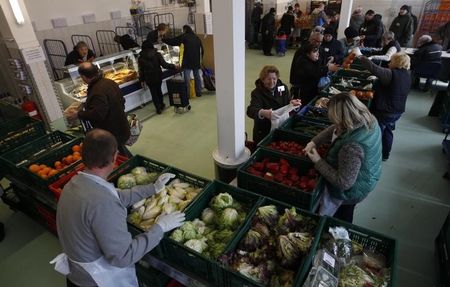By Michelle Martin
BERLIN (Reuters) - Annual inflation in Europe's largest economy held steady in August, data showed on Thursday, suggesting there is still a risk the euro zone rate will fall and increasing the dilemma for the European Central Bank over whether to take action.
Preliminary data from the Federal Statistics Office showed consumer prices rose by 0.8 percent in August, both on the measure harmonised to compare with other European Union countries and on the non-harmonised measure.
That was bang in line with the consensus forecast in a Reuters poll but well below the ECB's target of close-to-but-just-under 2 percent for the euro zone.
Preliminary inflation data for the single currency bloc, due on Friday, is forecast to show the annual rate slowing to 0.3 percent from 0.4 percent - already its weakest level since October 2009 - according to a Reuters poll conducted ahead of the German data release.
Marco Wagner, an economist at Commerzbank, said the German reading had done nothing to change that.
"Germany's inflation rate was unchanged at 0.8 percent in August but Spanish prices have fallen a bit faster than last month and high unemployment will likely dampen inflationary pressures in both France and Italy so the euro zone inflation rate probably fell to 0.3 percent," he said.
"That means further ECB measures will probably continue to be discussed," he added.
Data published earlier on Thursday showed Spanish consumer price inflation came in at minus 0.5 percent, lower than in July, and Belgian annual inflation fell to its lowest level since November 2009 this month.
With inflation in what the ECB considers a "danger zone" of below 1 percent, the central bank cut interest rates to record lows in June and launched a series of measures to pump money into the sluggish euro zone economy.
Economists generally said the ECB would likely wait to see the impact of these measures before announcing further action despite the low inflation readings published on Thursday.
Jennifer McKeown, senior European economist at Capital Economics, said the bank would, however, probably hint at "full-blown quantitative easing" when its governing council meets next week, though she said she did not expect it to announce such a programme until the turn of the year.
ECB President Mario Draghi stressed at the Jackson Hole central bankers' meeting last week that the central bank was ready to do more, saying it was prepared to respond with all its "available" tools if inflation in the euro zone dropped further.
But ECB sources have told Reuters the bank is unlikely to take new policy action next week unless August inflation figures show the euro zone sinking significantly towards deflation.
Christian Schulz, senior economist at Berenberg Bank, said the stable inflation rate in Germany made it unlikely the euro zone figure would fall significantly.
"In any case, the ECB will look through the monthly volatility at its meeting next week. Without a sudden drop in inflation, the ECB may have gained some time before deciding on further stimulus measures," he added.
Energy prices in Germany fell by 1.9 percent on the year in August but service costs rose by 1.4 percent and the cost of goods and food rose modestly.
On the month, consumer prices were unchanged on both and EU-harmonised and a non-harmonised prices, in line with forecasts.

Final price data for August is due to be released on Sept. 11, the statistics office said.
(Reporting by Michelle Martin; Editing by Stephen Brown/Jeremy Gaunt)
